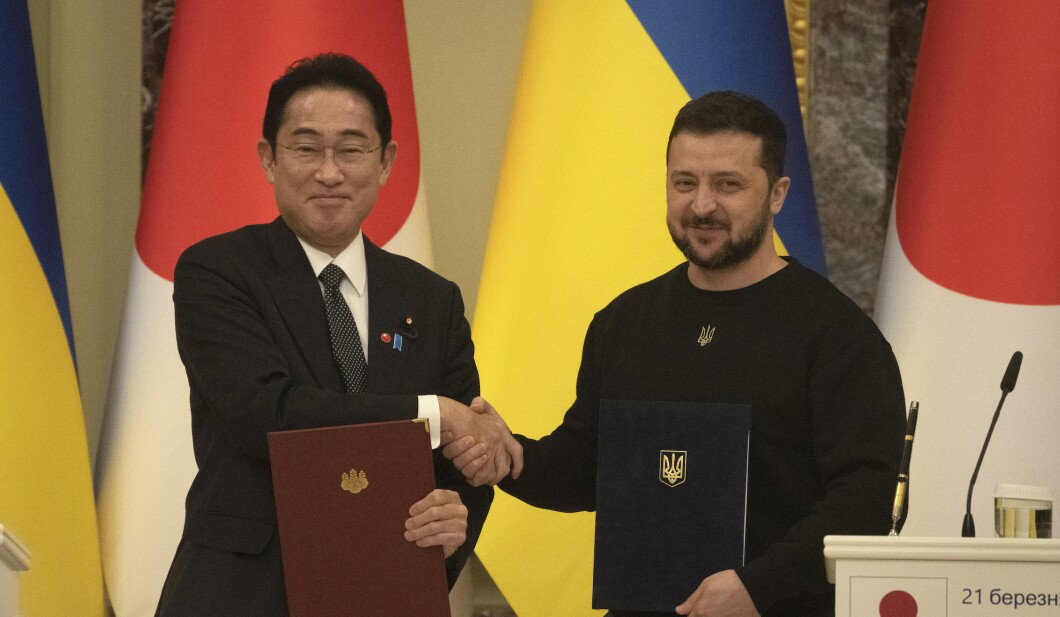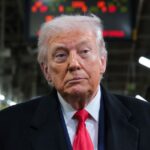
Japanese Prime Minister Fumio Kishida expressed “great anger” over the murder of Ukrainian civilians by Russian forces during a surprise visit to Kyiv that coincided with Chinese General Secretary Xi Jinping’s trip to Russia.
“I really feel great anger at the atrocity upon visiting that very place here,” Kishida told reporters Tuesday after a visit to Bucha. “I would like to give condolence to all the victims and the wounded on behalf of the Japanese nationals. Japan will keep aiding Ukraine with the greatest effort to regain peace.”
BLINKEN: XI GIVING PUTIN ‘DIPLOMATIC COVER FOR RUSSIA TO CONTINUE TO COMMIT’ WAR CRIMES
Kishida swept into Kyiv off the back of a visit to New Delhi, where he gave a wide-ranging speech on his desire to coordinate with India to “foster the region into a place that values freedom, the rule of law, free from force or coercion.” And his trek to Ukraine immediately thereafter underscored Tokyo’s emergence as a counterweight, alongside the United States, as a counterweight to Russia’s cooperation with China.
“China has chosen [a] side,” a senior European official in Kyiv told the Washington Examiner. “And Japan balanced the picture by showing immediately which side they are. Pure antagonism.”

Zelensky extended an invitation to Kishida in January. The fact that the visit coincided with Xi’s portentous trip to Moscow offered Ukrainian policymakers “a hugely symbolic” diplomatic counterpoint.
“It’s hugely symbolic because it emphasizes that relations with Japan are much more important than relations with China,” Ukrainian lawmaker Oleksandr Merezhko, who chairs the Ukrainian parliament’s foreign affairs committee, told the Washington Examiner. “So if China is interested in bringing more chaos into the world system, into international relations — in contrast, Japan is interested in maintaining order, regional and global order.”
The visits continue an emerging pattern of U.S. allies and partners in Europe coordinating with allies in the Indo-Pacific — one that the U.S. hopes will continue, as President Joe Biden’s top envoy in Tokyo made clear on Tuesday. Xi and Kishida’s dueling itineraries reflect “two very different European-Pacific partnerships,” Rahm Emanuel, the U.S. ambassador to Japan, suggested.
“Prime Minister Kishida is making an historic visit to Ukraine to protect the Ukrainian people and promote the universal values enshrined in the U.N. Charter,” Emanuel, a former Chicago mayor and White House chief of staff during Biden’s first term as vice president, wrote on Twitter. “Approximately 900 kilometers away, a different and more nefarious partnership is taking shape in Moscow. … Against these two Pacific leaders visiting Europe, Prime Minister Kishida stands with freedom and Xi stands with a war criminal. Which Pacific leader is the right partner for a brighter future?”
Japanese officials have exerted a more shaping influence on diplomatic and security arrangements in recent years. The late Japanese Prime Minister Shinzo Abe pioneered the concept of the “free and open Indo-Pacific” as Chinese forces placed military assets on artificial islands in the South China Sea and increased their presence around the islands at the center of a territorial dispute between Beijing and Tokyo.
Kishida has accelerated that project in the year since Putin launched the full-scale offensive to overthrow the Ukrainian government — an offensive launched from the protection of Russia’s nuclear weapons umbrella that Kishida fears will be taken as a precedent for Chinese or North Korean aggression. The prime minister’s national security team crafted a plan for a rapid upgrade of Japan’s ability to repel “invasions against its nation,” as the latest national security strategy put it, and Kishida emphasized his focus on deterring a clash in the Indo-Pacific.
“As we have seen with the aggression against Ukraine, major geopolitical shifts are taking place at the heart of the vast Eurasian Continent,” Kishida said Monday at the Indian Council of World Affairs. “One could say it is a tragedy. I want to free the oceans from such geopolitical risks. There is an imperative to protect and nurture the public ocean bounty that we all share.”
Kishida described India as “an indispensable partner” in those efforts. He adopted a tone calibrated to accommodate India’s “historical and cultural background.” A former British colony with a Cold War tradition of nonalignment and a democratic system of governance, India has avoided frank condemnations of Russia’s invasion of Ukraine and continued to import Russian oil but also warned Moscow not to use nuclear weapons and continued to cooperate with the U.S. and the rest of the Quad in other areas.
“Even during the COVID-19 pandemic, there were no voices at all in either Japan or India that said that a totalitarian system of governance would be better,” Kishida said in an apparent effort to underscore the ideological divisions between India, China, and Russia. “At the same time, both Japan and India have unique historical backgrounds. … It follows that Japan and India have a great responsibility for maintaining and strengthening ‘a free and open international order based on the rule of law.’”
CLICK HERE TO READ MORE FROM THE WASHINGTON EXAMINER
India and other states across “the so-called Global South” have resisted Western appeals to condemn Putin, perhaps partly due to Russia’s invocation of Western imperialism to elicit sympathy in the developing world. Kishida’s efforts have raised Ukrainian hopes that Japan could be a more effective partner in persuading such states to take a harder line on Kremlin aggression.
“Japan — it’s well known in the Global South, and it’s respected by India,” Merezhko said. “Japan is more influential; it’s more known … so Japan can be helpful for us in trying to draw more attention [among] Indians and by India to Ukraine.”






